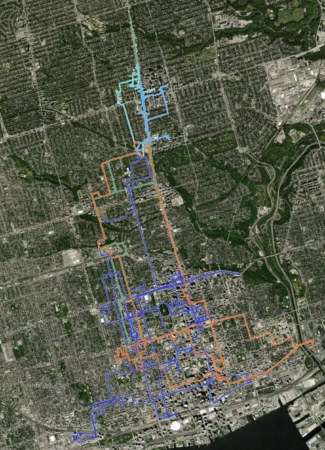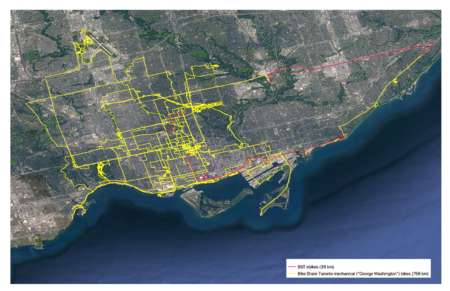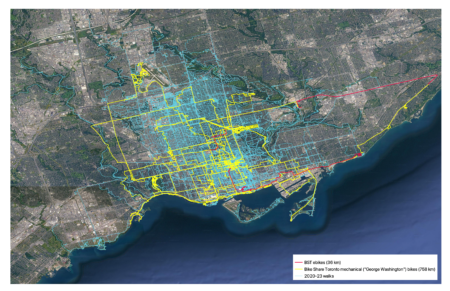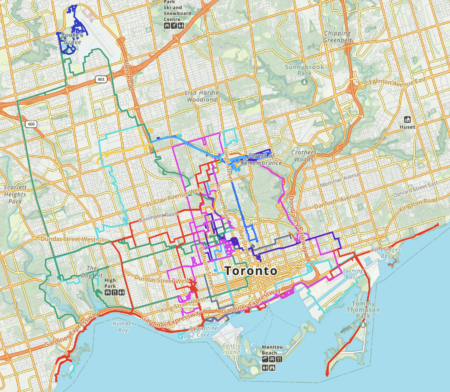It is hard to say when it began, because the stress and loneliness of the PhD blended into my post-PhD feelings, but it’s quite fair to say that I have been feeling consistently low at least since I learned that I would have to leave my old home in North York in March.
One big contributor is surely the feeling of anticlimax after the dissertation was released. This wasn’t some obscure academic tract about an issue of specialist interest, but a very current-day analysis of humanity’s most pressing problem. I was expecting, or at least hoping for, debate and pushback from people in the activist and policy communities. So far, the most substantial response to what I wrote has been a half-hour discussion with my brother Mica and his wife Leigh when they were visiting Toronto. In the dissertation I express my worry that — even though their aspiration and plan is to change the world — activists get caught up in routine behaviours like marches which occupy their time and effort but do little to change minds or policy. The total non-response to my research so far is a minor bit of additional evidence that activists aren’t generally too compelled by external analyses of their efficacy.
Another dimension is no doubt simple isolation. The layers have been stacking for me in that area: it’s harder to make and keep friends as an adult, it’s harder when you’re no longer a student, and it has become harder as people have pulled their social attention inward to a small group during the pandemic. Getting anybody to attend any sort of event has become substantially harder, and as corollaries the events that do happen have less attendance and energy and there are fewer events.
Another item for this decidedly non-comprehensive list is my sense that most of the people who I know (or, at least, peers and younger people — the dynamics of the affluent and established are different) are not doing well. People seem stymied in achieving the sort of adult lives they want, and especially in finding any sort of work which is psychologically and materially rewarding. It feels like to a large extent our parents got rich and retired, but most of us have never been able to move up into the positions they held at our stage of life. As with housing, there is a feeling that the older and best-off parts of the population have grabbed everything and are keeping it for themselves. This feeling becomes especially embittering when paired with the knowledge that they are actively choosing to hand over a ruined planet to their descendants every time they keep electing leaders who keep the future-wrecking fossil fuel industry going.
It is hard to escape the feeling that I have spent the last 20+ years building up for what I thought would be an intense period of intellectual effort, civilizational re-consideration, and mass political re-organization… and have found myself instead in an epoch where smaller-scale but acute disruptions have monopolized public attention to the point where we seem to be paying even less attention to the big trends than we were 10-15 years ago. It’s very hard to feel optimistic about the future, and it is simultaneously profoundly alienating when society at large is choosing to ignore the existential seriousness of the crisis which we are in. Living among people who are likely to be remembered as history’s greatest wreckers (on the optimistic assumption that anyone will be around with luxuries like paper and literacy to write the history of the present) carries with it feelings of rage and hatred against everything around me: the cars pumping out their fumes in a million lines idling behind red lights, the kaleidoscopic variety in our supermarkets at the same time as we are smashing the Earth’s biodiversity and capacity to support us, the elections that still turn on trivialities even though the consequences of our choices are as serious as death…
Feeling that our civilization is such a disaster is utterly isolating, since our fellow human beings cannot help taking that personally as a criticism and rejection of their own lives and priorities. Meanwhile, it’s impossible to have any confidence in the future. Over the last 20+ years, humanity has shown that we are totally capable of knowing the consequences of our actions and the stakes being played for and still choosing to ruin the world which we inherited. As much as I sincerely delight in the possibilities and experiences of life, I don’t know how to avoid the feeling of being a witness during the time of humanity’s downfall.




